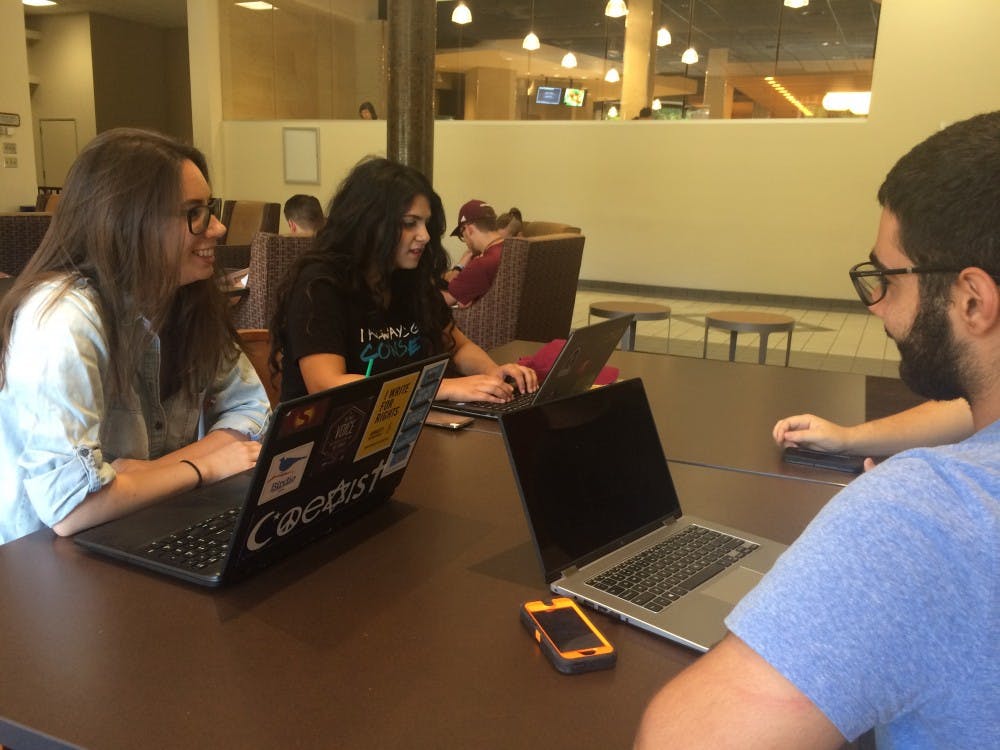A group of ASU students has joined forces with student organizations all across the university to contribute much-needed resources to displaced families in Lesvos, Greece.
This year there are more than 65 million refugees, displaced people and asylum seekers all around the globe which marks the largest influx of refugees since World War II. Many major government agencies are left scrambling to gather resources to accommodate those fleeing war-torn countries.
Meanwhile Samantha Hill, a sophomore in psychology, along with Lee Goodrum, a global studies and political science junior, began working together to collect supplies for refugees staying at the Kara Tepe Refugee Camp.
Hill and Goodrum got the idea for starting the Refugee Support Alliance organization last spring after Goodrum had returned from a trip to a Greek refugee camp with the Social Justice and Human Rights program.
“What I noticed on the ground is that all the actual work in these refugee camps in these facilities is done by really small-scale, localized (non-governmental organizations) that have very little funding,” Goodrum said.
She also pointed out more well-known humanitarian groups aren’t necessarily more effective in providing aid overseas.
“These big large-scale NGO’s are really just a black hole for money and supplies and just because they are so big it’s hard to organize things,” Goodrum said.
Having witnessed the pure potential that small-scale non-profits have, Goodrum and Hill worked to get the Refugee Support Alliance up and running as soon as possible, kickstarting it in June. The organization is focused on acting as a “middleman” to provide supplies for smaller organizations working with refugees at the Kara Tepe refugee camp in Greece.
“The organization that we’re working with in Greece — their office is a chair and a laptop under a tarp so they’ve very low overhead,” Goodrum said. “Almost all the money that they get goes directly to supporting people in need and not to fat bonuses for the board.”
The project that Goodrum and Hill are currently working on involves a clothing drive where students can drop off donations at the Memorial Union in Tempe for them to be shipped to the Kara Tepe Camp sometime in October. Hill encouraged students to contact her by email to schedule a pickup for donations.
Along with helping aid refugees, Hill and Goodrum said they seek to educate students in order to dispel the many misconceptions about the refugee crisis.
With 21.3 million refugees in the world, according to figures reported by the UN Refugee Agency, all kinds of misinformation gets fed to news consumers which can lead to generalizations and prejudices towards refugees.
“There are more misconceptions than there is real accurate information,” Hill said. “One of the big ones is people kind of thinking that these refugees have a choice in leaving and they really don’t because if you’re living in Syria, if you don’t leave, it’s very likely that you’re going to die.”
Hill said the high risk factor that refugees face by staying in their home countries is the definitive difference between someone who is considered a refugee and a migrant.
She said migrants typically flee their home countries in hopes of better economic or social opportunities elsewhere.
Goodrum brought up the point that Americans in the states have made the words "migrant" and "refugee" too synonymous specifically when discussing Latin America.
“People fleeing persecution and violence in Latin America aren’t being treated as refugees,” she said.
A figure that the Refugee Support Alliance would also like people to be aware of is that more than half of the 4.1 million refugees registered through the United Nations are women and male children.
Biology sophomore Abdurrahman Bayazid is a native of Syria, works with Syrian refugees resettled in the area, and is now also working with Hill and Goodrum in the Refugee Support Alliance.
“I would tell a person: Don’t believe something until you yourself hear it from that person — then you can say whether it’s true or not,” Bayazid said.
Bayazid said he has heard a number of real accounts from Syrian refugees who, despite their circumstances, have found hope.
“There’s this one guy — he has PTSD — he saw his brother and father being executed in front of him, so I went with him to a psychiatric appointment, and I was translating for him,” Bayazid said.
Bayazid said when the man was asked about his outlook on his future he said, “I love to live.”
Reach the reporter at jdivy1@asu.edu or follow @joydanielleivy on Twitter.
Like The State Press on Facebook and follow @statepress on Twitter.




